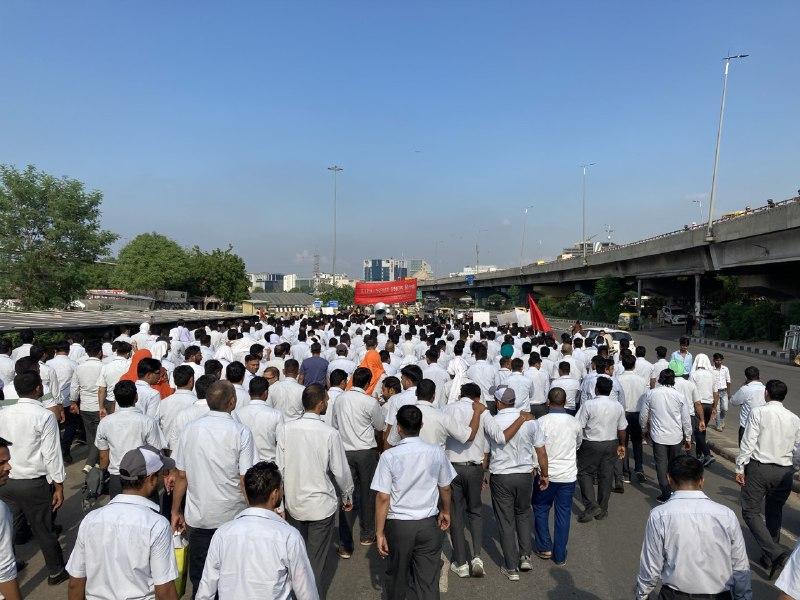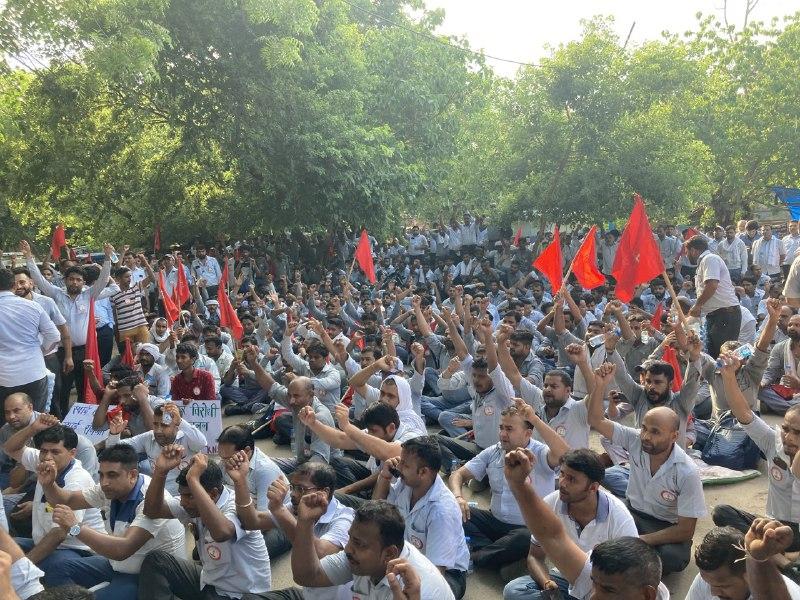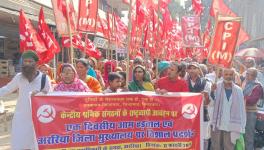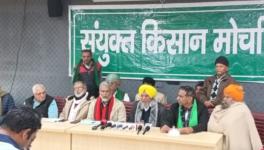Maruti Manesar Violence: 10 Years Later, Workers’ Vent Ire Against Labour Codes, ‘False Cases’, Want Jobs Back

Industrial workers march in Gurugram on Monday, demanding withdrawal of false cases in the 2012 Maruti violence case. Image clicked by Ronak Chhabra
Manesar: Withdrawal of “false cases” against their jailed colleagues; reinstatement of all those terminated in a “vindictive” manner; and repeal of the yet-to-be-implemented four Labour Codes – these were the key demands by workers that rented the air in the industrial belt of Gurgaon-Manesar in Haryana on Monday,
As Monday marked the 10th anniversary of the July 2012 violence in the Maruti Suzuki car manufacturing plant in Haryana’s Manesar, industrial workers rallied in thousands to flay the ‘partial’ investigation of the incident.
Clad in factory uniforms, with their red-coloured union flags in hand, workers in Haryana’s automotive hub also made a pitch for “more solidarity” and “joint actions” between permanent and contractual workforce, as they carried out a march to Gurugram’s Mini Secretariat on Monday evening.

A public meeting outside Gurugram's Mini Secretariat was organised on Monday. Image clicked by Ronak Chhabra.
Joined by union delegations from major auto plants in the region, the rally was called by Maruti Suzuki Mazdoor Sangh (MSMS), a coming together of permanent workers’ unions in at least seven manufacturing facilities associated with the country’s leading carmaker – including two of its plants in Manesar; one in Gurugram; and the rest being the Maruti Suzuki’s automotive part manufacturers.
In March 2017, the District and Sessions Court in Gurugram had convicted 31 of the 148 accused while acquitting the rest in the high-profile case, pertaining to the violence in the factory premises that led to the death of a senior Human Resource executive in 2012.
On July 18, that year, Maruti Suzuki’s the administrative block in Manesar was partially ablaze during the violence following a tussle between workers and the management, in which Awanish Kumar Dev, general manager (human resources) of Maruti Suzuki, died. The incident led to a lock-out, and fleeing of about 3,000 workers, most of them in their 20s, overnight after police crackdown.
According to reports, the first information report filed by the company reportedly named 55 workers and 600 others.
After long-drawn out legal proceedings, out of 31 convicted workers, the court sentenced 13, including 12 office bearers of the then Maruti Suzuki Workers’ Union, to life imprisonment on charges of murder and attempt to murder relating to the killing of Dev; 18 were charged with rioting, trespassing, causing hurt and other related offences under Indian Penal Code.
Over the years, according to MSMS, several convicted workers in the said case were granted bail, even as one convict remains in jail. Two of the convicts, Pawan Dahiya and Jiya Lal, died of electrocution and cancer, respectively, during their parole period last year, The Hindu reported earlier in February.
The bail plea of the remaining convict is scheduled to come up for hearing in August, NewsClick was told on Monday.
“The life imprisonment sentence of 13 workers must be immediately annulled, and false cases on all those convicted must be withdrawn,” demanded Rajesh Kumar, president, MSMS, on Monday.
According to him, the convictions were part of the “vindictive” measures against the then Maruti workforce, as has also been suggested by multiple reports over the years.
“The Maruti workers were pressing for the formation of their union, and after the struggle of many months, in March 2012, the management was finally forced to grant formal recognition to the union. However, after several years, we see that the top leaders of the union are all sentenced to life imprisonment,” Kumar remarked while speaking to NewsClick.
“Till now, an impartial investigation of the [2012] incident has not been carried out, and the guilty management/administration has not been punished,” the MSMS said in Hindi in a memorandum addressed to the President of India on Monday.
“On the other hand, by declaring this incident as a class war by the government administration, the jobs of about 2,500 workers were snatched,” it further read.
The Maruti Suzuki management fired 546 permanent workers and 1,800 temporary workers soon after the untoward incident of July 2012. On Monday, the MSMS demanded the reinstatement of all those terminated then.
Industrial Workers Oppose Labour Codes
The fate of the Maruti Suzuki Manesar workers is a story of not just a handful of manufacturing facilities, but a “well-thought” approach of the Central and the state governments across the country against the labour class, Anil Pawar of All India Trade Union Congress (AITUC) said while addressing the protesting industrial workers in Gurugram on Monday.
Shyam of Manesar-based All India Contract Workers Union (AICWU), who was attending the rally, said: “Formation of unions, ending of contractualisation system, and living wages are among the burning issues of industrial workers across the country. These were the same issues over which the Maruti Suzuki workers were raising their voice before the July 2012 incident; these are more relevant than ever today, as various struggles in the industrial quarters show,” he told NewsClick.
Shyam cited the example of Manesar-based JNS Instruments Limited, three of whose workers, according to him, are in jail after violence broke near the manufacturing facility earlier this year in March during the two-day general strike called by Central Trade Unions.
“Tensions within the industrial sector will only increase with the implementation of the Labour Codes as they take away the hard-won rights of the workers,” Ajit Singh of Bellsonica Auto Components Employees’ Union told NewsClick on Monday.
According to him, the latest attack on workers’ rights can only be fought if there’s “more solidarity” between the permanent and the contractual workforce.
“It is high time joint actions of permanent and temporary workers are waged to pressure the management to accept our legitimate demands,” he said.
NewsClick has earlier reported on how with the implementation of the four Codes, among others, the Centre has proposed to limit the collective bargaining of workers in the industries. Now and then, trade unions in the countries have voiced their opposition against the Codes for similar reasons, with MSMS on Monday reiterating their demand to repeal the four legislations.
On Monday, the marching industrial workers also condemned the holding of a panchayat earlier this month in Manesar that had called for an economic boycott of Muslim shopkeepers. Days after the public congregation, the organisers, claiming to represent the Hindu society, had also issued an ultimatum to the administration to conduct an enquiry to evict alleged illegal immigrants.
“Such events are nothing but an attempt to divide the workers here in Manesar. The industrial unions must make sure that no such division on lines of religion or caste is drawn among the workers,” Singh said.
Get the latest reports & analysis with people's perspective on Protests, movements & deep analytical videos, discussions of the current affairs in your Telegram app. Subscribe to NewsClick's Telegram channel & get Real-Time updates on stories, as they get published on our website.























